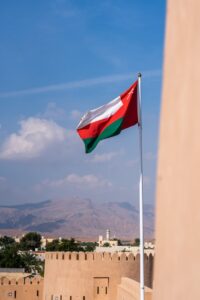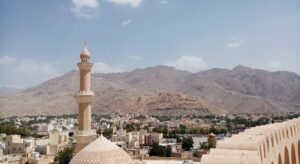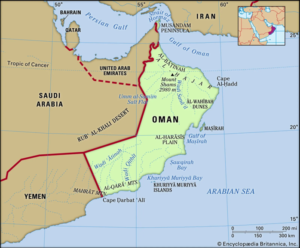
By Ivan Vrhovac, King’s College London Alumn
Oman is a country locked between Saudi Arabia on the North, Yemen on the west, and the Persian and Indian Gulf on the eastern, maritime side. Its location is strategically interesting as it is at the intersection of maritime trade routes connecting India, Asia, the Middle East, and Europe, historically utilized by the Portuguese Empire, and later the British.
The country is a sultanate, an equivalent of an absolute monarchy which is a rarity in today’s world. However, with its abundant oil reserves and rather inclusive sovereign, its economic model has proved sustainable. Traditionally, the country’s riches were based on fisheries, agriculture, and trade before the 1960s and 1970s, when vast oil reserves were discovered which substantially increased the nation’s exports and revenue.
In line with the oil-centric nature of the country, it is inherently connected to the strength of Saudi Arabia and other OPEC countries which periodically assemble to discuss production amounts and price per barrel targets. This is important since Oman can therefore be considered somewhat of a spectator in the determination of oil production & prices, conducted exclusively by larger neighboring countries. For a country of 5 million inhabitants, and a 75% reliance on Oil in the government budget, i.e. 26% of the GDP, this is a severe burden as such a small country is unable to proactively influence and determine its economic might. As for other industrial activities, Oman is notably present in manufacturing, shipping, and mining. A notable tertiary activity is tourism, with a local specialty of Dates.

Nizwa, Oman
I have identified 3 main aspects the country should prioritise to ensure a more prosperous future:
1 – Oil
The price of oil is trending around $80 as of January 2024, this price is attractive to Oman as it finds oil relatively cheaply from shallow underground reserves, i.e. the cost of digging is not expensive compared to shale oil in the US.
However, it needs to gradually diversify from its ‘gold mine’ as the resource clearly isn’t the future. Green initiatives should slowly be put in place to ensure a smoother transition for future decades. Oman has already put in place fiscal programmes in 2020 to reduce public debt and diversify revenue sources. Notably, green hydrocarbon development has been put forward to benefit from the windfall linked with the global energy transition.
Nevertheless, it is still a challenge as oil concentration dates back 50 years and diversification proves to be slow since main revenue still comes from oil. In an even more delicate way, when OPEC cuts oil production, Oman feels the negative effects two-fold as GDP declines on lower crude prices while not having other verticals developed enough. A delicate balance between gradual and successful diversification, while matching ongoing oil strength needs to be stroked.
2 – Tourism
Tourism isn’t perhaps the first thing that springs to mind when mentioning Oman, however, its beautiful coast and rich historic sites attract tourists. The country receives 15% of its GDP through tourism activities which is significant. A bigger emphasis on infrastructure and hospitality offerings, as well as restauration and service quality, could help to attract more tourists to the coast. Some positive results have been observed and the government showed a willingness to double down on their efforts.
“The Ministry of Heritage and Tourism noted tourist arrivals have impressively surpassed pre-pandemic levels, jumping from 2.5 million in 2019 to 2.9 million in 2022”.
“This uptick in tourism has significantly boosted local employment, aligning well with Oman Vision 2040 job creation goal.”
OMRAN Group is focusing on human capital development. Initiatives like #IAmTourism and the Najm Initiative were launched in 2023 to enhance skills and create a workforce ready to meet the demands of the burgeoning tourism sector.
“While accommodations remain vital, our vision for the next five years is centred on diversifying our offerings to cater to evolving traveller demands.”
3 – Social and Economic Empowerment
The biggest known hurdle facing a traditionalist Sunni Muslim country is its social question. Employment opportunities predominately offered to men are well entrenched, with women occupying a secondary role in the workplace. In economic theory, this creates inefficiencies and leads to a worse allocation of human capital in the country, leading to less efficient markets and lower country output. Oman is aware it will need to transform as modern societies evolve and has put in place a wide Economic Empowerment programme, “Oman Vision 2040”, which targets structural and holistic social and economic reforms.
The extent to which the country assumes the current status quo is the extent to which its potential is going to be limited.
“Oman’s Vision 2040 outlines a comprehensive roadmap for building a Diversified and Sustainable Economy, grounded in Technology, Knowledge, and Innovation”.
Oman Vision 2040 aims to achieve several goals: diversification in higher education institutions, insurance of intergenerational equity, development of entrepreneurship and innovation, and geographical development based on decentralization.
Although set as an ambitious target, the fact that the government has put an initiative in place targeting social and economic empowerment is a step in the right direction, even if most of the targets aren’t eventually met. Early results have been already observed, with policies resulting in upgrades coming from international rating agencies.

Oman Map
Image Source: Britannica
Progressive policies can have rapid effects on a small country, similarly observed in countries that underwent fast internationalization, with very tangible positive economic consequences ensuing.
In conclusion, the country can be content as it does sit in a better place than it did a few decades ago. However, among neighbors in the Saudi peninsula, it is still one of the most restrictive ones from a social aspect. Its oil dependency and view on social organization are two main hurdles that will hamper the fulfillment of its potential in the long term, not to mention the indirect spillovers from the ongoing conflict in Gaza which should be closely monitored by the Sultanate.
Sources:
- Foreign Ministry of Oman: https://www.fm.gov.om/about-oman/state/economy/
- Times of Oman: https://timesofoman.com/article/139669-tourist-arrivals-in-oman-surpass-pre-pandemic-levels
- Yahoo Finance: https://finance.yahoo.com/news/resecurity-embarks-accelerating-omans-vision-125600399.html?guccounter=1&guce_referrer=aHR0cHM6Ly93d3cuZ29vZ2xlLmNvbS8&guce_referrer_sig=AQAAANgkOse4hMd0d9ICxyyD196IRvb4Ig5YPaqIImJd2G1O4PBHPX2VcgRKgnpuspOLOM6FY-l0zlzl9cdY5NTGT2MIdaa7BgwP_a3TPKI2oPh4jl2UeQc_5Ue2hsz2_cj-9FBig-H1Nf24briwrtQBuEqVMMcf9-jdIgINfEKSay8Q
- CNBC: https://www.cnbc.com/2023/11/22/oil-group-opec-and-its-allies-delay-policy-setting-meeting.html
- Oman Observer: https://www.omanobserver.om/article/1137036/oman/hydrocarbon-to-be-the-driver-of-omans-future-growth

Ivan Vrhovac
Ivan is a King’s College London graduate from Croatia. He is interested in the public markets, macroeconomic developments, and new industry trends. He enjoys meeting curious people and learning about different cultures.